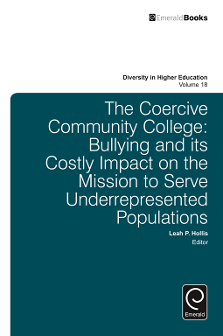
Foreword
ISBN: 978-1-78635-598-0, eISBN: 978-1-78635-597-3
ISSN: 1479-3644
Publication date: 6 July 2016
Citation
Woodland, C. (2016), "Foreword", The Coercive Community College: Bullying and its Costly Impact on the Mission to Serve Underrepresented Populations (Diversity in Higher Education, Vol. 18), Emerald Group Publishing Limited, Leeds, pp. ix-x. https://doi.org/10.1108/S1479-364420160000018002
Publisher
:Emerald Group Publishing Limited
Copyright © 2016 Emerald Group Publishing Limited
Leah P. Hollis in her latest work, The Coercive Community College: Bullying and Its Costly Impact on the Mission to Serve Underrepresented Populations, has produced another informative yet revealing account on the disruptive and destructive impact of bullying on faculty morale and productivity within the community college sector. An important contribution of Dr. Hollis’s research is the depth and breadth of her probing questions in examining the interactional factors associated with workplace bullying. For the purposes of this volume, she used a primary data set to address cost, labor unions, and the impact of bullying on people of color, students of color, and gender/sexual minorities. The extended study frames those experiences and accounts of what victims of workplace bullying encounter on a day-to-day basis in their community college environment. Throughout this text, the effect on people of color remains prevalent, through the effect on students of color through to the consequences when presidents of color are bullied.
The data for this publication was generated from a 35-question survey disseminated to faculty and administrators employed at 142 community colleges nationally. The results provide the reader with a profile of alarming statistics and anecdotal accounts offered by open-ended remarks that document the pervasiveness of workplace bullying within the community college environment. A disturbing trend implicit from a majority of the respondents noted that workplace bullying had an impact on morale at the community college and that such behavior is a common occurrence. Further, they complain that such behavior results in no action on the part of administration due to a convoluted, nonresponsive process.
Another important aspect of this study is that it draws attention to the costly problem of workplace bullying and its disproportionate impact on people of color and the impact of faculty incivility on first-generation community college students. Other areas of micro aggressive interpersonal strife are detailed in reports offered by former top-level administrators, including a former community college president. An institutional culture enveloped in a daily onslaught of interpersonal conflict is the reality portrayed in several scenarios provided in this chronicle. Documented accounts of bullying based on Hollis’s research provide the reader with a close encounter of incivility at its worst within the walls of academe. The price being paid by colleagues caught in the crossfire of bullying antics is a sobering reality about the toll that workplace bullying exacts from its victims. Several Bullying Scenarios are provided that offer firsthand accounts of denigrating and intimidating acts inflicted against colleagues with the aim of creating a work environment fraught with anxiety and concern about one’s career stability.
Dr. Hollis’s findings highlight the need for policymakers, trustees, and institutional leaders to place workplace bullying as an agenda item for immediate action by implementing professional development programs, policies, and procedures anchored with sanctions and disciplinary actions for violators of said policies. Such action on the part of institutional leaders will serve notice that workplace bullying will not be normalized within the institution’s culture. Instead, this is an issue that leaders must address with the resolve of creating and fostering an institutional culture that engenders civility and mutual respect for colleagues and subordinates alike.
Dr. Calvin Woodland has an extensive career in community college administration, once serving as the president of Capital Community College in Hartford, Connecticut, and also interim CEO at the University of the District of Columbia Community College. Other service includes member of the Connecticut Community Colleges System’s Council of Presidents, the Hartford Metro-Alliance’s Economic Development Committee, and team chair for the New England Association for Schools and Colleges. Also, he serves as a commissioner on the American Association Community Colleges Commission on Academic, Student and Community Development, the National Council for Community Justice, and the Commission on Diversity, Inclusion and Equity. Further, he has served the national president for the National Council on Black American Affairs (NCBAA), the oldest affiliated council of American Association of Community Colleges (AACC). Dr. Woodland holds a Doctor of Psychology degree in Clinical Psychology from the California Southern University and Doctor of Education degree in Higher Education Administration and Counseling from Rutgers University.
- The Coercive Community College: Bullying and its Costly Impact on the Mission to Serve Underrepresented Populations
- Diversity in Higher Education
- The Coercive Community College: Bullying and its Costly Impact on the Mission to Serve Underrepresented Populations
- Copyright Page
- List of Contributors
- Foreword
- Introduction: Getting More with Honey
- Bruising the Bottom Line: Cost of Workplace Bullying and the Compromised Access for Underrepresented Community College Employees
- When the President is Bullied: A Diverse Sample of Narratives that Chronicle the Effect on the Community College Mission
- Color Outside the Lines: The Impact of Workplace Bullying on People of Color Working in Community Colleges
- The Importance of Professor Civility in a Computer-Based Open-Access Environment for a Minority-Serving Institution
- Labor Intensive: Workplace Bullying, Union Membership, and Unrealized Civil Rights for People of Color
- Socially Dominated: The Racialized and Gendered Positionality of Those Precluded from Bullying
- Insult to Injury: The Extent of Bullying for Gender and Sexual Minorities in Community Colleges
- Cybershaming – Technology, Cyberbullying, and the Application to People of Color
- Stop Bullies in Their Tracks: Bullying Scenarios Reflecting on Underrepresented Groups
- Call to Action: Strategies to Create and Maintain Civility for Underrepresented Groups in the Community College
- Epilogue: A Word of Empathy
- Acknowledgements
- A Word about the Primary Author
- About the Authors